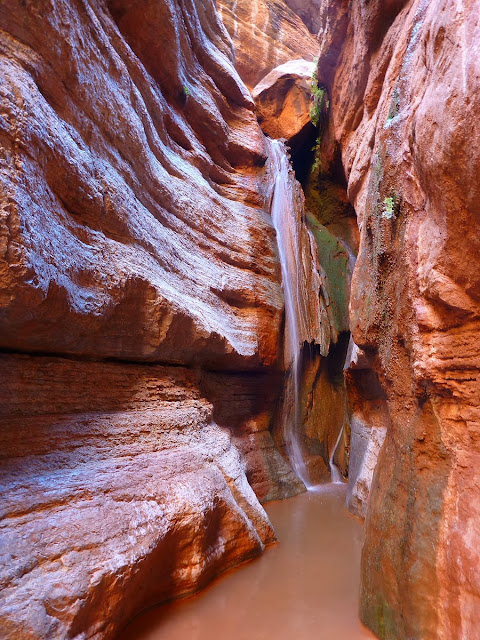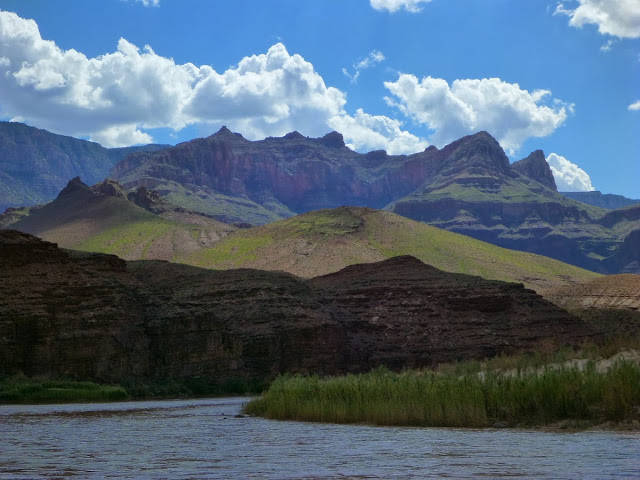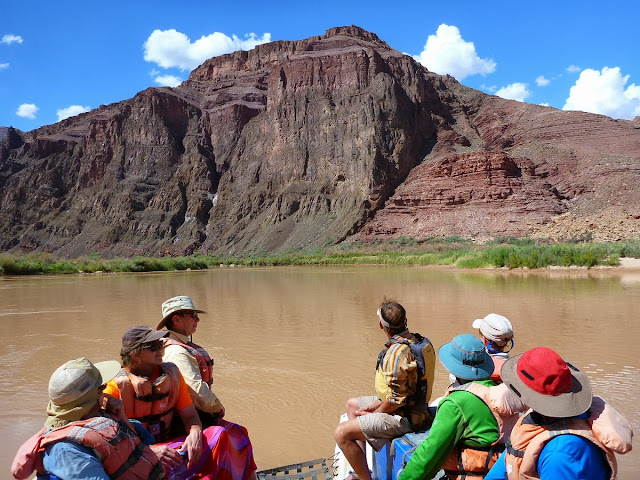This years trip was run under the auspices of the Grand Canyon Field Institute (GCFI), their first ever offering of a motorized rafting trip. It will now be an annual trip (sorry - the 2014 departure is already oversubscribed, but the 2015 trip will soon be taking reservations - book with GCFI). The trip this year was an unqualified success - great education from three interpreters, fantastic hikes (including two new ones for me), and absolutely perfect weather. The outfitter was Arizona Raft Adventures (AzRA), one of the most experienced outfitters on the river in Grand Canyon. Here are the pictures and stories.
Just two days before the start of our trip, Cathedral Wash near Lees Ferry flashed with a vengeance and sent these six-foot wide boulders down toward the Colorado River.
The Paria River went to 6,500 cfs but had dropped back to 100 cfs by the start of the trip.
The S-rig running House Rock Rapid. Flows ran between 7,000 and 13,000 cfs on the Colorado River.
The rains made the canyon come alive with greenery. I cannot recall the last time I saw the canyon this lush. I schedule the late sumer time to take advantage of the "second wilflower" season.
Resurrection moss is full glory.
A side hike up into Nautiloid Canyon is always a treat to observe these fossils found in the Mississippian Redwall Limestone.
Fresh rains made the datura metaloides flourish.
We only experienced about 100 drops of rain on the very first day. These thunderheads were the last ones seen for the 2013 monsoon, a season to remember.
At Eminence Camp, Nikki Cooley shares stories about her Navajo culture. The setting was unrivaled.
Meanwhile the boatmen were baking our after dinner dessert.
In the mornings we always have a geology talk to explain what we are going to see during the day. There is no place beeter to learn geology than on the river for 225 miles.
Colorado four o'clock growing along the trail to Saddle Canyon.
Into the green in Saddle Canyon. The fragrance of the plants was like being in a perfume factory!
Saddle Canyon waterfall.
Marble Canyon tranquility.
Learning about the ancient landscapes of the Grand Canyon.
A loop hike into Carbon Creek Canyon is always fun.
The boulders are large and interesting.
Group photo at the Butte Fault.
The Precambrian Galeros Formation (bottom 3/4's of photo) can only bee seen in the Chuar basin in Grand Canyon and represents deposition in a shallow sea about 800 million years ago.
Looking south to the Tanner Trail where the grass overwhelmed the hillside.
Boatman Jerry Cox pointing out the Butte Fault where it crosses the Colorado River.
More green as we make the turn at the "big bend" of the Colorado River beneath Desert View.
Another quite moment on the rafts with a shadowed Comanche Point in the upper right.
Our wonderful boatmen, Ed, Katie, and Jerry.
Elves Chasm enchantment.
Nikki made Navajo fry bread one night - the first time I have ever enjoyed this local food on the river.
One of the new hikes I got to experience was the overland route from the Middle Granite Narrows to Deer Creek. Here is the view across to the south side of the river with the desert in full summer bloom.
The brittle bush (Encelia farinosa) was so full and green.
This was a great hike with lots of well-watered barrel cactus (Echinocactus polycephalus).
Hiking in the green. The temperatures were often 90 during the day and mid-60's at night.
Deer Creek is a lush drainage that is tributary to the Ciolorado River.
The Deer Crek waterfall where it enters the river.
Horn coral fossils seen along the river in a boulders that rolled down from the cliffs above.
The occotillo (Foquieria splendens) was fully leafed out everywhere.
Crossing Havasu Creek for a swim in the warm water.
Big horn ram seen at River Mile 158 below Havasu Canyon.
Running Lava Falls.
And the joy afterwards.
Group shot at 212 Camp, September 23, 2013. Thanks to our wonderful crew and AzRA. And for all of the excellent hikes, camps, swims, conversations and explorations in Grand Canyon.
















































